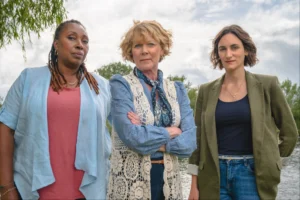I just finished watching the Marlow Murder Club and took away something from it that I did not expect. I’m not going to get into a detailed review of why the show is good or bad but instead talk about the real-world ramifications that I’m not sure were even intended. Law enforcement isn’t engaged with the citizens they are supposed to protect and serve.
The Marlow Murder Club tells the story of Judith Potts, a retired woman living in a large estate she inherited from an aunt, and her involvement and investigation of a local murder.
The Basic Plot of The Marlow Murder Club
It’s important to understand the plot of the Marlow Murder Club in order to understand the topic of today’s post. Judith Potts is swimming along in the river when she overhears an argument followed by a gunshot. She immediately begins to investigate.
Eventually there are more murders and Potts involves Suzie Harris, a local dogwalker, and Becks Starling, the wife of the town’s church leader.
Local Law Enforcement
The constabulary is led by DS Tanika Malik who is new to the job and eager to prove her worth although suffering somewhat from imposter syndrome. Malik’s team of investigators is able enough but the leads they follow don’t get them any closer to solving the crime. Meanwhile, Potts finds useful clue after useful clue.
Eventually Malik recognizes Potts is helpful and hires on the trio to aid in the investigation. That’s the point I’d like to discuss today.
It neatly coincides with the brilliant but hard to watch miniseries We Own this City. In that show Treat Williams plays Brian Grabler, a retired Baltimore detective now teaching at the police academy. At one-point Grabler gives a monolog where it lambastes the Baltimore police department’s personnel as unable to investigate crime. They do not have the skills nor the contacts. They never get out of their cars, he says.
This is, in my opinion, an enormous disconnect which impacts both citizens and law enforcement in a negative fashion. The officers just are not in the communities they protect serve. The people in those communities don’t know the officers and the officers don’t know the people.
Officers spend their off hours drinking at the union lodge, not in the community at the local pub. They don’t go have breakfast at the diner where everyone who is anyone in town meets. They don’t get their hair cut at the barbershop. Thus, they are unable to solve crimes with the help of the locals. The focus isn’t even really on solving crimes, it’s on generating revenue but that’s another topic.
The Rural and Urban Divide
All the problems I just listed here are exacerbated by a large population. In rural areas with small populations, it’s easier for law enforcement to be a part of the fabric of the community. In urban areas the opposite is true and I think, sadly, a lot of law enforcement departments have just given up trying to be part of the community. They don’t live there, they don’t socialize there, they avoid the places they patrol.
In rural areas people find it difficult to understand why urban dwellers don’t trust the police. While in urban areas people don’t understand unconditional support for law enforcement. What’s wrong with those idiots? Don’t they see how it is?
They do see, they just see it from their own lens.
Solutions
Solutions are not easy in a densely populated urban region. Police have outreach programs where they visit schools and what not but that really doesn’t solve the disconnect problem. Law enforcement officers must be part of the community they serve. There must be trust.
I think the slow way back involves local police offices scattered liberally throughout an urban center. A small number of officers who remain in that area patrol on foot, have breakfast, grab a brew, and create relationships with the people. It will take time, it will take money, and it will take the desire to change.
Is all that possible in today’s climate of distrust, even hate? I’m not sure. Still, I advocate the effort.
Tom Liberman
